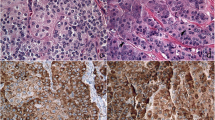Abstract
Studies on neuroendocrine differentiation (NED) in conventional gastric adenocarcinomas and its significance on tumor behavior are limited. Our aim was to search for the expression of neuroendocrine differentiation in conventional gastric adenocarcinomas and correlate it with tumor type, stage and expression of VEGF and p53. Forty-two gastrectomy specimens with gastric adenocarcinoma were stained with chromogranin A to detect neuroendocrine differentiation and 45% of the cases were found to be NED (+). No significant correlation was found between NED and tumor type. However, NED was more frequent in advanced stage cases independently of tumor type. VEGF expression was also considerably more frequent in NED (+) tumors compared to NED (−) ones (84% vs. 56%). Moreover, we found a significant correlation between NED and the presence of lymph node metastases. P53 expression in NED (+) tumors was 68%. There was no significant correlation between VEGF and p53 in NED (+) cases. In conclusion, neuroendocrine differentiation is a frequent finding in conventional gastric adenocarcinomas, and although it does not seem to play a specific role in tumor progression, it seems that neuroendocrine cells are one of the factors contributing to angiogenesis by expressing VEGF, especially in advanced stage cases, affecting the incidence of lymph node metastases. Further studies with larger series should be performed to confirm this observation.
Similar content being viewed by others

References
Allen FJ, Van Velden DJ, Heyns CF: Are neuroendocrine cells of practical value as an independent prognostic parameter in prostate cancer? Br J Urol 75: 751–754, 1995
Blumenfeld W, Chandhoke D, Jageman P: Neuroendocrine differentiation in gastric adenocarcinomas. An immunohistochemical study. Arch Pathol Lab Med 120: 478–481, 1996
Bostwick DG, Qion J, Pacelli A, et al: Neuroendocrine expression in node positive prostate cancer: Correlation with systemic progression and survival. J Urol 168: 1204–1211, 2002
Hamilton K, Chiappori A, Olson S, et al: Prevalence and prognostic significance of neuroendocrine cells in esophageal adenocarcinoma. Mod Pathol 13: 475–481, 2000
Helge L, Waldum, Brenna E, Sandvik A: Relationship of ECL cells and gastric neoplasia. Yale J Biol Med 71: 325–335, 1998
Hiroshima K, Iyoda A, Shibuya K, et al: Prognostic significance of neuroendocrine differentiation in adenocarcinoma of the lung. Ann Thorac Surg 73: 1732–1735, 2002
Indinnimeo M, Cichini C, Memeo L, et al: Correlation between chromogranin A expression and pathological variables in human colon carcinoma. Anticancer Res 22: 395–398, 2002
Kyokane K, Ito M, Sato Y, et al: Expression of bcl-2 and p53 correlates with the morphology of gastric neoplasia. J Pathol 184: 382–389, 1998
Maehara Y, Kabashima A, Koga T, et al: Vascular invasion and potential for tumor angiogenesis and metastasis in gastric carcinoma. Surgery 128: 408–416, 2000
Maeda K, Kong SM, Onoda N, Ogawa M: Expression of p53 and vascular endothelial growth factor associated with tumor angiogenesis and prognosis in gastric adenocarcinoma. Oncology 55: 594–599, 1998
Miremadi A, Finder SE, Lee AH, et al: Neuroendocrine differentiation and prognosis in breast carcinoma. Histopathology 40:211–214, 2002
Ooi A, Hayashi H, Katsuda S, et al: Gastric adenocarcinoma cells with endocrine differentiation show no evidence of proliferation. Hum Pathol 23: 736–741, 1992
Ooi A, Mai M, Ogino T, et al: Endocrine differentiation of gastric carcinoma. The prevalence as evaluated by immunoreactive chromogranin A and its biologic significance. Cancer 62: 1096–1104, 1998
Park JG, Choe GY, Helmon LJ, et al: Chromogranin-A expression in gastric and colon cancer tissues. Int J Cancer 51: 189–194, 1992
Qvigstad G, Arne K, Sandvik A, et al: Detection of chromogranin A in human gastric adenocarcinomas using a sensitive immunohistochemical technique. Histochemical J 32: 551–556, 2000
Saito H, Tujitani S, Ikeguchi M, et al: Neoangiogenesis and relationship to nuclear p53 accumulation and vascular endothelial growth factor expression in advanced gastric carcinoma. Oncology 57: 164–172, 1999
Waldum HL, Brenna E, Sandvik A: Relationship of ECL cells and gastric neoplasia. Yale J Biol Med 71: 325–335, 1998
Waldum HL, Aase S, Kuetnoi I: Neuroendocrine differentiation in human gastric carcinoma. Cancer 83: 435–444, 1998
Wu MS, Shen OJ, Sheu JC: Overexpression of mutant p53 and C-erbB-2 proteins and mutations of the p15 and p16 genes in human gastric carcinoma. J Gastroenterol Hepatol 13: 305–310, 1999
Author information
Authors and Affiliations
Corresponding author
Rights and permissions
About this article
Cite this article
Eren, F., Çelikel, Ç. & Güllüoğlu, B. Neuroendocrine differentiation in gastric adenocarcinomas; correlation with tumor stage and expression of VEGF and p53. Pathol. Oncol. Res. 10, 47–51 (2004). https://doi.org/10.1007/BF02893409
Received:
Issue Date:
DOI: https://doi.org/10.1007/BF02893409



